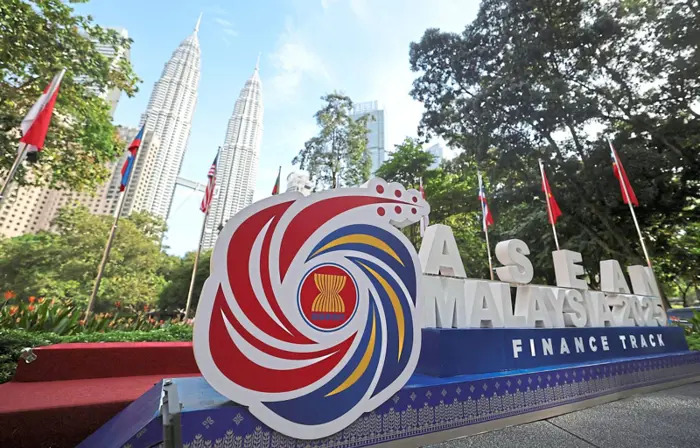
United front: Effective negotiation with the US is the top priority but Asean regional solidarity is also essential. — Reuters
IT’S a short relief as US President Donald Trump pressed the pause button on his sweeping tariffs, but as the world knows by now, he is totally unpredictable.
We never know what’s coming and the 90-day reprieve Trump has announced will only help give us some breathing room to navigate the next storm.
When announcing his tariffs for more than 180 countries – on top of a blanket 10% duty on almost all imports to the United States – Trump spared Malaysia’s semiconductor industry, a critical sector which accounts for 22.8% of Malaysia’s US-bound exports.
While the industry is exempted from tariffs for now, no one will dare to say for how long.
The national Geo Economic Command Centre, headed by Prime Minister Datuk Seri Anwar Ibrahim, will meet again tomorrow to plan its moves.
There is certainly much urgency at the Prime Minister’s Office in Putrajaya.
The leaders of each country have adopted different approaches and methods on how best they can cut a deal with Trump and reassure their domestic concerns and interests.
How about Malaysia? What will it do about the 24% tariff that has been imposed on it?
The Anwar leadership has adopted the “resilience, not retaliation” approach, recognising the fact that we are just a small trading country.
We are in no position to stand up against the mighty Americans, and that is not our plan anyway.
China is perhaps the only country that has decided, and which dares, to take on the US with retaliatory measures as the world looks on helplessly at the two economic giants battling it out.
Both the US and China are among our top trading partners, with Malaysia continuously emphasising that we will remain neutral between these two nations.
Malaysia knows its position. So we must take a prudent approach.
However, remaining calm does not mean not doing anything.
As analyst Dr Rais Hussin wrote, Malaysia has helped to contain the shock, preserved investor confidence, protected domestic industries, and reinforced its standing as a proponent of rules-based trade.
“Against this backdrop, Malaysia’s decision to remain measured sends a stabilising signal to global investors.
“Amid rising protectionist rhetoric, a predictable, rules-based environment becomes increasingly appealing,’’ he wrote.
The Anwar administration has rightly implemented a multi- faceted strategy to mitigate the impact of the tariff imposed by focusing on diplomatic engagement, economic resilience, and regional cooperation.
Calls have already been made, without any fanfare or publicity, to key American officials and influential figures.
Investment, Trade and Industry Minister Datuk Seri Tengku Zafrul Aziz, who chaired the Asean Economic Ministers’ meeting last week, said Malaysia hopes to secure regional consensus to face the burdens and to take a more solid stance as a group.
Various Asean members, notably Vietnam and Cambodia, have been slapped with much higher tariffs than Malaysia, and some argue that they would require different approaches.
The hardest hit are Cambodia (49%), Laos (48%), Vietnam (46%), Myanmar (44%) and Thailand (36%). Brunei is in a similar predicament as Malaysia at 24%, while Philippines (17%) and Singapore, facing a baseline tariff of 10%, are a bit better off.
The question is whether Trump will want to talk to Asean as a bloc or would prefer to deal individually with each country.
Malaysia, as the Chair of Asean now, remains committed to cooperating with member countries in reducing disruptions, strengthening economic resilience, and fighting for a balanced and stable trade relationship.
At the same time, Malaysia is leveraging the Malaysia-US Trade and Investment Framework Agreement to negotiate exemptions and address trade imbalances.
Certainly, we must step up our commitment to seeking solutions through continuous engagement with the White House.
More than ever, we need our Malaysian ambassador to Washington DC to be in place as soon as possible. The career diplomat, who has yet to be officially named, has already been endorsed by His Majesty, the King of Malaysia. It would be good if his credentials are accepted by the US soon.
Tengku Zafrul has also announced plans to lead a delegation to Washington DC to discuss the tariff.
At the same time, Malaysia has begun to engage in a diversification of partnerships to actively expand relations with other nations and seek trade opportunities.
This includes leveraging Malaysia’s role in multilateral trade agreements to reduce reliance on any single market.
As the saying goes, there is an opportunity in every crisis. This is the time for Malaysia to accelerate economic reforms to strengthen fundamentals and enhance resilience against external shocks.
Malaysia is also utilising regional agreements like the Regional Comprehensive Economic Partnership and Comprehensive and Progressive Agreement for Trans-Pacific Partnership to diversify trade and reduce reliance on the US market.
It is important that the country embraces multiculturalism to sidestep geopolitical crossfires and fast track opening new markets.
Certainly, our partnership in BRICS with its emerging market economies, namely Brazil, Russia, India, China, and South Africa is a big help.
Likewise, for the first time, Asean heads of government will meet with the Gulf Cooperation Council (GCC) and China as part of the Asean Malaysia 2025 programme. The GCC comprises the powerful Saudi Arabia, Bahrain, Kuwait, Oman, Qatar, and United Arab Emirates.
The bottom line is that while Malaysia’s non-confrontational multifaceted approach aims to minimise immediate damage, long-term risks remain, including potential supply chain reconfigurations and reduced foreign investment.
Effective negotiation with the US is the top priority but Asean regional solidarity is also essential.
As Asean leaders prepare to meet in Kuala Lumpur next month, everyone understands the need to adapt to shifting global trade dynamics as disorder becomes the norm now.





